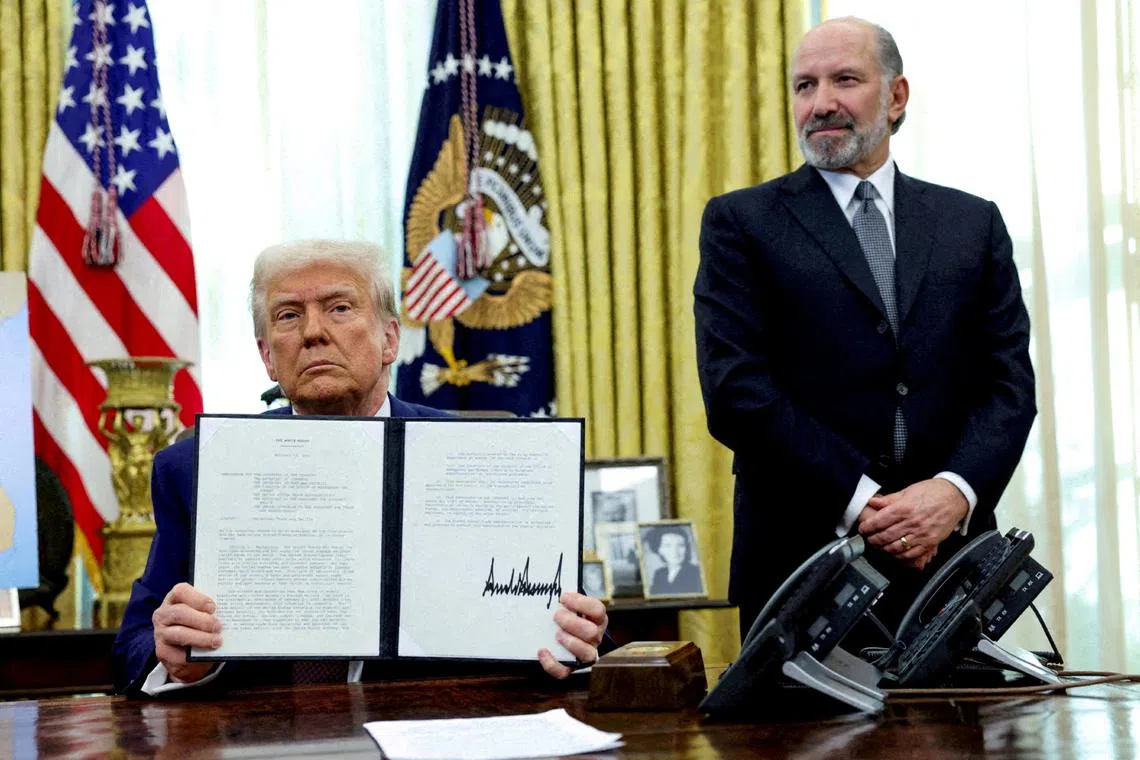Trump says he will be ‘kind’ with tariffs as deadline looms
Sign up now: Get ST's newsletters delivered to your inbox

US President Donald Trump said he could also unveil more sector-specific levies without giving further details.
PHOTO: REUTERS
WASHINGTON – US President Donald Trump on March 31 said he would be “very kind” to trading partners when he unveils further tariffs this week, risking global turmoil to address what he says are unfair trade imbalances.
Mr Trump – who has been making unprecedented use of presidential powers since taking office in January – said he could announce as early as on the night of April 1 exactly what “reciprocal tariffs” will be imposed.
The Republican billionaire insists that reciprocal action is needed because the world’s biggest economy has been “ripped off by every country in the world”, promising “Liberation Day” for the US.
He could also unveil more sector-specific levies.
Asked for details, he told reporters on March 31: “You’re going to see in two days, which is maybe tomorrow night or probably (April 2).”
But he added: “We’re going to be very nice, relatively speaking, we’re going to be very kind.”
Critics warn that the strategy risks a global trade war, provoking a chain reaction of retaliation by major trading partners like China, Canada and the European Union.
Already, China, South Korea and Japan agreed on March 30 to strengthen free trade among themselves
But Mr Trump said on March 31 he was not worried that his action would push allies towards Beijing, adding that a deal on TikTok could also be tied to China tariffs.
White House press secretary Karoline Leavitt told reporters that the goal on April 2 would be to announce “country-based tariffs”, although Mr Trump remains committed to imposing separate sector-specific charges.
The uncertainty has jolted markets with key European and Asian indexes closing lower, although the Dow and broad-based S&P 500 eked out gains.
Market nervousness intensified after Mr Trump on March 30 said his tariffs would include “all countries”.
The Wall Street Journal reported that day that advisers have considered imposing global tariffs of up to 20 per cent, to hit almost all US trading partners.
Mr Trump has remained vague, saying his tariffs would be “far more generous” than ones already levied against US products.
Economic pain
Mr Trump’s fixation on tariffs is fanning US recession fears. Goldman Sachs analysts raised their 12-month recession probability from 20 per cent to 35 per cent.
This reflects a “lower growth forecast, falling confidence, and statements from White House officials indicating willingness to tolerate economic pain”.
Goldman Sachs also lifted its forecast for underlying inflation at the end of 2025.
China and Canada have imposed counter-tariffs on US goods, while the EU unveiled its own measures to start in mid-April.
Vietnam said it cut import duties on a range of goods including cars, liquefied gas and some agricultural products.
Japan has said it will set up about 1,000 “consultation centres” for businesses hit by US tariffs.
International Monetary Fund chief Kristalina Georgieva said at a Reuters event on March 31 that Mr Trump’s tariffs are causing anxiety, although their global economic impact should not be dramatic.
Mr Ryan Sweet of Oxford Economics said to “expect the unexpected”, anticipating that the US President would “take aim at some of the largest offenders”.
Besides reciprocal country tariffs, Mr Trump could unveil additional sector-specific levies on the likes of pharmaceuticals and semiconductors.
He earlier announced auto tariffs to take effect on April 3.
Economists have expected the upcoming salvo could target the 15 per cent of partners that have persistent trade imbalances with the US, a group that US Treasury Secretary Scott Bessent has dubbed the “Dirty 15”.
The US has some of its biggest goods deficits with China, the EU, Mexico, Vietnam, Taiwan, Japan, South Korea, Canada and India.
Existential moment
US trade partners are rushing to minimise their exposure, with reports suggesting India might lower some duties.
European Central Bank president Christine Lagarde said on March 31 that Europe should move towards economic independence, telling radio channel France Inter that Europe faces an “existential moment”.
Separately, British Prime Minister Keir Starmer spoke with Mr Trump on “productive negotiations” towards a UK-US trade deal, while German Chancellor Olaf Scholz said the EU would respond firmly to Mr Trump but is open to compromise.
Ms Greta Peisch, partner at law firm Wiley Rein, said it is “entirely possible” for fresh tariffs to be swiftly reduced or put on hold.
In February, Washington paused steep levies on Mexican and Canadian imports for a month as the North American neighbours pursued negotiations. AFP


